Audi Q2 VS Toyota Aygo – Specs, Efficiency & Price Comparison
Which model is the better choice – the Audi Q2 or the Toyota Aygo? We compare performance (300 HP vs 72 HP), boot capacity (405 L vs 231 L), efficiency (4.80 L vs 4.80 L), and of course, the price (24900 £ vs 15500 £).
Find out now which car fits your needs better!
The Audi Q2 (SUV) is powered by a Petrol or Diesel engine and comes with a Manuel or Automatic transmission. In comparison, the Toyota Aygo (SUV) features a Petrol engine and a Manuel or Automatic gearbox.
When it comes to boot capacity, the Audi Q2 offers 405 L, while the Toyota Aygo provides 231 L – depending on what matters most to you. If you’re looking for more power, you’ll need to decide whether the 300 HP of the Audi Q2 or the 72 HP of the Toyota Aygo suits your needs better.
There are also differences in efficiency: 4.80 L vs 4.80 L. In terms of price, the Audi Q2 starts at 24900 £, while the Toyota Aygo is available from 15500 £.
Compare all the key specs now and find out which model fits your lifestyle best!
Audi Q2
The Audi Q2 captures attention with its bold and distinctive design, combining compact dimensions with a sporty silhouette. Inside, the cabin boasts high-quality materials and a modern infotainment system, ensuring a comfortable driving experience. With its agile handling and efficient performance, the Q2 is a perfect urban companion for those seeking both style and functionality.
details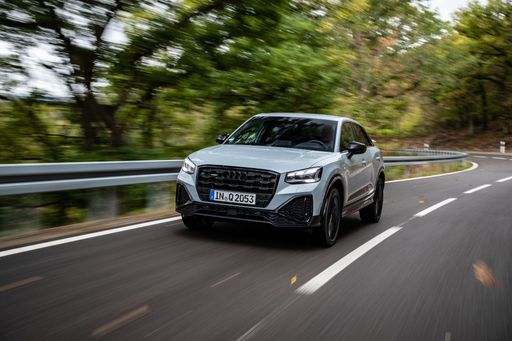 @ audi-mediacenter.com
@ audi-mediacenter.com
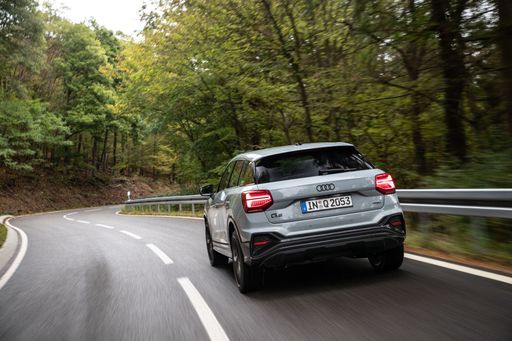 @ audi-mediacenter.com
@ audi-mediacenter.com
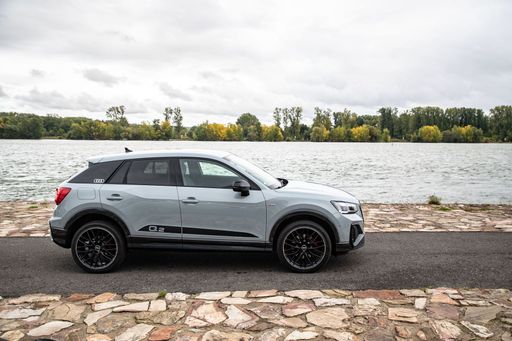 @ audi-mediacenter.com
@ audi-mediacenter.com
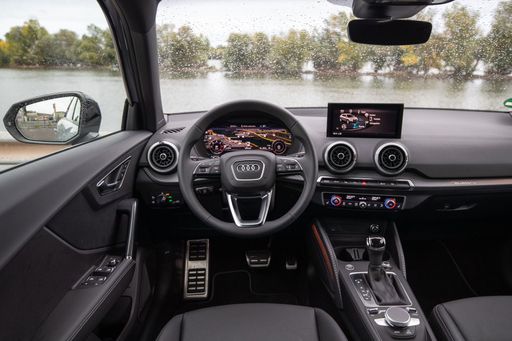 @ audi-mediacenter.com
@ audi-mediacenter.com
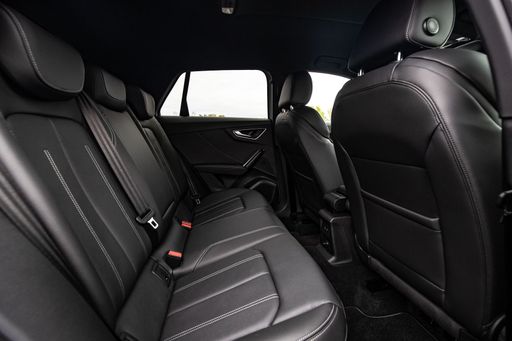 @ audi-mediacenter.com
@ audi-mediacenter.com
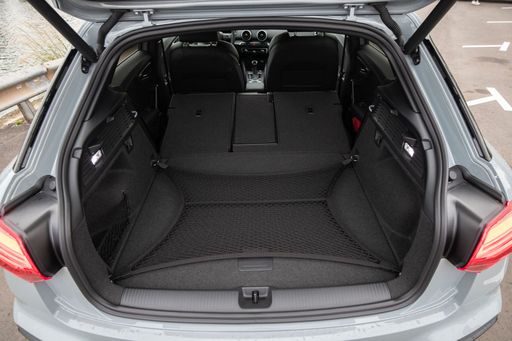 @ audi-mediacenter.com
@ audi-mediacenter.com
Toyota Aygo
The Toyota Aygo presents itself as a compact city car, perfect for navigating tight urban spaces with ease. Its stylish design is complemented by a vibrant variety of colour options, making it a standout choice for those looking to express their individuality. Inside, the Aygo offers a comfortable and functional cabin, equipped with modern features that enhance the overall driving experience.
details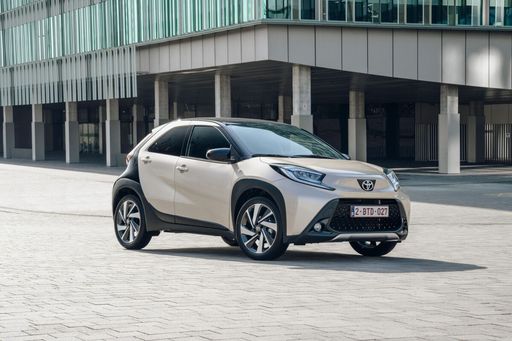 @ Toyota
@ Toyota
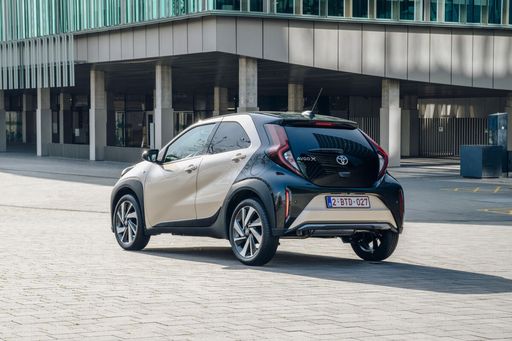 @ Toyota
@ Toyota
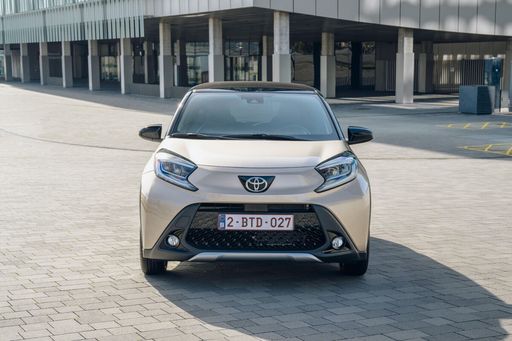 @ Toyota
@ Toyota
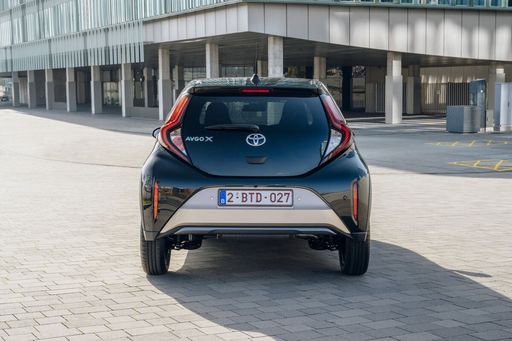 @ Toyota
@ Toyota
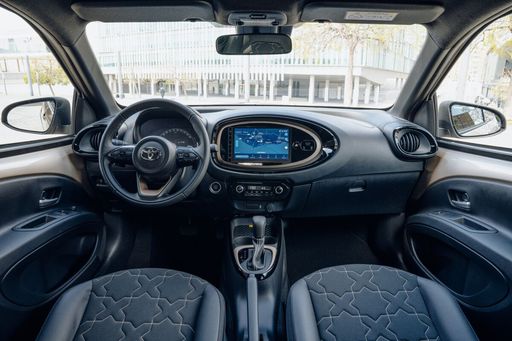 @ Toyota
@ Toyota
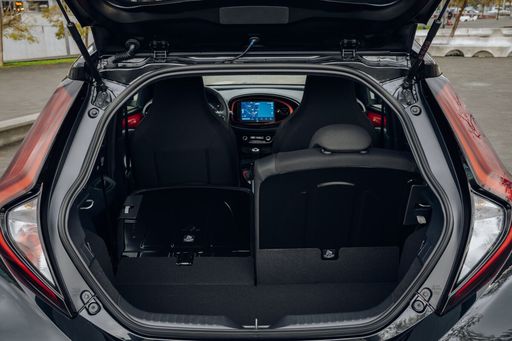 @ Toyota
@ Toyota

|

|
|
|
|
Costs and Consumption |
|
|---|---|
|
Price
24900 - 43600 £
|
Price
15500 - 21200 £
|
|
Consumption L/100km
4.8 - 8.4 L
|
Consumption L/100km
4.8 - 4.9 L
|
|
Consumption kWh/100km
-
|
Consumption kWh/100km
-
|
|
Electric Range
-
|
Electric Range
-
|
|
Battery Capacity
-
|
Battery Capacity
-
|
|
co2
127 - 190 g/km
|
co2
108 - 111 g/km
|
|
Fuel tank capacity
50 - 55 L
|
Fuel tank capacity
35 L
|
Dimensions and Body |
|
|---|---|
|
Body Type
SUV
|
Body Type
SUV
|
|
Seats
5
|
Seats
4
|
|
Doors
5
|
Doors
5
|
|
Curb weight
1330 - 1610 kg
|
Curb weight
1015 kg
|
|
Trunk capacity
355 - 405 L
|
Trunk capacity
231 L
|
|
Length
4208 - 4216 mm
|
Length
3700 mm
|
|
Width
1794 - 1802 mm
|
Width
1740 mm
|
|
Height
1495 - 1508 mm
|
Height
1510 mm
|
|
Payload
450 - 510 kg
|
Payload
345 kg
|
Engine and Performance |
|
|---|---|
|
Engine Type
Petrol, Diesel
|
Engine Type
Petrol
|
|
Transmission
Manuel, Automatic
|
Transmission
Manuel, Automatic
|
|
Transmission Detail
Schaltgetriebe, Automat. Schaltgetriebe (Doppelkupplung)
|
Transmission Detail
Schaltgetriebe
|
|
Drive Type
Front-Wheel Drive, All-Wheel Drive
|
Drive Type
Front-Wheel Drive
|
|
Power HP
116 - 300 HP
|
Power HP
72 HP
|
|
Acceleration 0-100km/h
4.9 - 10.5 s
|
Acceleration 0-100km/h
15.5 - 15.6 s
|
|
Max Speed
197 - 250 km/h
|
Max Speed
151 - 158 km/h
|
|
Torque
200 - 400 Nm
|
Torque
93 Nm
|
|
Number of Cylinders
3 - 4
|
Number of Cylinders
3
|
|
Power kW
85 - 221 kW
|
Power kW
53 kW
|
|
Engine capacity
999 - 1984 cm3
|
Engine capacity
998 cm3
|
General |
|
|---|---|
|
Model Year
2024
|
Model Year
2024 - 2025
|
|
CO2 Efficiency Class
D, E, F, G
|
CO2 Efficiency Class
C
|
|
Brand
Audi
|
Brand
Toyota
|
Audi Q2
The Audi Q2 demonstrates a perfect blend of compact dimensions and luxury features, making it a prominent choice in the competitive SUV segment. With an attractive exterior design, high-quality interiors, and cutting-edge technology, it stands out as a versatile vehicle for urban commuters and weekend adventurers alike.
Striking Design and Practicality
The Q2’s design is a clear reflection of Audi's sophisticated aesthetics. Its bold stance is accentuated by angular lines and a distinctive Singleframe grille. Measuring between 4208 mm and 4216 mm in length, it remains compact yet offers ample interior space for passengers and cargo alike. The rear boasts a hatchback design, contributing to a practical trunk capacity of 355 to 405 litres, perfectly suited for everyday tasks.
Engine Options and Performance
Audi caters to diverse customer preferences by offering a range of engine choices, from efficient petrol units to powerful diesels. Engine power ranges from 116 to 300 PS, ensuring lively performance, while the 0-100 km/h acceleration time varies between 4.9 and 10.5 seconds, depending on the variant. The model year 2024 continues to impress with its harmonic balance of performance and economy, with fuel consumption figures ranging from 5.1 to 8.4 L/100 km.
Advanced Transmission and Drive Technologies
The Q2 is available with both manual and automatic transmissions, including Audi’s sophisticated S tronic dual-clutch system. Front-wheel drive and all-wheel drive options offer flexibility for different driving conditions, ensuring exceptional grip and stability on the road. With available torque figures from 200 to 400 Nm, the Q2 responds adeptly to driver commands, providing a dynamic driving experience.
Cutting-Edge Technology and Interior Features
Inside the Q2, the focus on quality is evident, with premium materials and clean lines that create a refined atmosphere. The multimedia interface features the latest in connectivity, including smartphone integration and a user-friendly interface. Optional upgrades such as the Virtual Cockpit and advanced driver assistance systems further enhance both comfort and safety, ensuring a worry-free driving experience.
Efficiency and Eco-Friendliness
Environmental considerations are integrated into the Audi Q2’s design, with CO2 emissions ranging from 130 to 190 g/km, depending on the chosen engine. The Q2 is available in several equipment lines such as ‘advanced’ and ‘S line’, allowing buyers to personalise their vehicle while taking advantage of the brand's commitment to sustainability. Fuel efficiency is balanced without compromising performance, confirming Audi's dedication to eco-friendly driving.
Conclusion: The Ideal Compact SUV
In summary, the Audi Q2 successfully embodies the perfect compact SUV, making it suitable for a variety of lifestyles. Its combination of distinctive design, flexible performance options, cutting-edge technology, and emphasis on efficiency make it a compelling choice for those seeking a premium vehicle that stands out on the roads and in the city.
Toyota Aygo
The Urban Maverick: Exploring the Toyota Aygo
The Toyota Aygo has long been a favourite for city dwellers and those who appreciate a compact yet stylish vehicle. With its latest iterations, the Aygo promises to deliver a blend of efficiency, modernity, and cutting-edge technology. Let's take a closer look at what this impressive vehicle has to offer.
Under the Bonnet: Technical Specifications
At the heart of the Toyota Aygo is a 1.0-litre three-cylinder engine. This petrol-powered engine is capable of producing 72 PS (53 kW) and offers a maximum torque of 93 Nm. The efficient engine achieves a fuel consumption of just 4.8 to 4.9 L/100km, making it an economical choice for urban commuting. The car features a front-wheel-drive layout and is available with either a manual transmission or a CVT automatic gearbox, providing flexibility for various driving preferences.
Performance on the Road
Despite its compact size, the Toyota Aygo offers a respectable acceleration from 0 to 100 km/h in just 15.5 to 15.6 seconds, with a top speed ranging between 151 and 158 km/h. This makes it well-suited for both city driving and highway cruising. The car's lightweight design of 1,015 kg ensures nimble handling and manoeuvrability in tight urban environments.
Design and Dimensions
The Aygo's contemporary exterior design is both attractive and functional. It measures 3,700 mm in length, 1,740 mm in width, and 1,510 mm in height, offering a compact footprint without sacrificing interior space. With five doors and four seats, the Aygo is practical for everyday use. The vehicle provides a boot space of 231 litres, ensuring you have enough room for groceries and luggage on the go.
Innovation and Features
The Toyota Aygo is equipped with a range of innovative features, enhancing the driving experience. Available in several trim levels including Business Edition, Explore, and Style, each comes with its own unique set of features. Standard offerings across trims include advanced safety features, a modern infotainment system, and optional extras such as climate control and advanced connectivity options.
Environmental Considerations and Efficiency
In line with environmental consciousness, the Toyota Aygo carries a CO2 efficiency class of C, with emissions ranging from 108 to 112 g/km. This ensures that the vehicle not only provides an efficient driving experience but also minimises its environmental impact. Additionally, the running costs are attractive, with estimated costs per kilometre between 27.4 and 31.3 cents, and monthly costs ranging from €685 to €783.
Pricing and Market Appeal
The Toyota Aygo is positioned competitively within the market, with pricing starting from €17,550 and reaching up to €23,950, depending on the selected trim and options. Its affordability, combined with its efficient performance and modern features, makes it an appealing choice for a wide range of buyers, particularly those seeking a reliable and economical vehicle for urban environments.
In conclusion, the Toyota Aygo stands out as a versatile and stylish city car that combines practicality with a touch of sophistication. Whether you're navigating busy urban streets or cruising on the motorway, the Aygo is well-equipped to handle the journey with ease and efficiency.
The prices and data displayed are estimates based on German list prices and may vary by country. This information is not legally binding.
